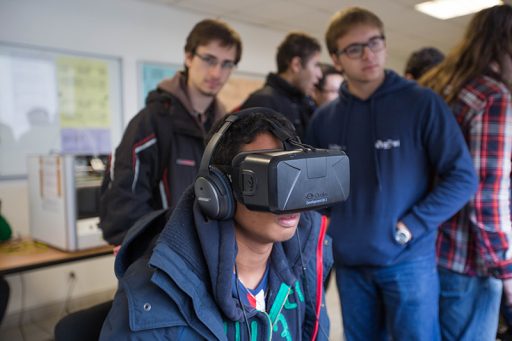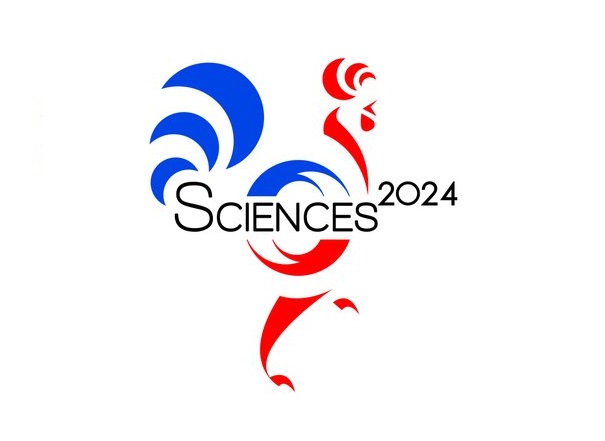Ce module a été développé afin de rendre le site Efrei accessible au plus grand nombre.
Si malgré notre vigilance, vous rencontriez le moindre problème d’accessibilité sur notre site, n’hésitez pas à nous contacter à l’adresse site-groupe@efrei.fr ou par téléphone au +33 188 289 000.

Research Axis
To fit in with the strategic priorities of French, European and worldwide Research Area, we have identified 4 research axis:
- Data and Artificial Intelligence – led by Katarzyna Wegrzyn-Wolska
- Security and Confidence – led by Layth Sliman
- Intelligent embedded systems – led by Elizabeth Colin
- Networks – led by Dario Vieira
Our objective is to develop partnership research through research projects applied to two application domains:
- Life Sciences
- Business transformation and innovation
Networks
5G technology aims to address the widest range of services and applications classified as enhanced mobile broadband (eMBB), massive machine type communications (mMTC) and ultra-reliable and low latency communications (URLLC). Network Slicing is emerging as a promising technology for designing a common infrastructure for different applications in business, industry, manufacturing and entertainment; Slicing allows a specific quality of service, Service Level Agreement, to be delivered for users according to vertical processes (IoT), wholesale business and enterprises considering security aspects and network dynamics.
In this axis, we propose new approaches to allocate sufficient resources to guarantee the desired Quality of Service / Quality of Experience for specific services considering the dynamic nature of the network and the security constraints, to provide flexible solutions enabling new business cases and vertical applications (e-health, smart car, smart city, …).
Digital Security and Confidence
Boosted by the many breakthroughs in the digital domain, new business models based on sharing and dynamic collaboration are emerging (virtual markets, Crowd Funding …). These models represent a massive opportunity for companies allowing them to share skills, to pool resources and to reduce costs, but also to strengthen innovation and agility.
But due to a lack of confidence and trust that would control the risks associated with security, many organizations remain reluctant to open their systems and share their data and processes. As a result, any collaboration scenario must provide a very high level of security and confidence to all partners involved.
Our team is dedicated to research related to the lifecycle of safe and secure collaboration systems. We conduct our research around innovative collaboration frameworks based on the principle of “trust and security by design”. It considers the constraints arising from the use of IoT and the involvement of human resources in the collaboration process both upstream, through verification and testing, and downstream, by strengthening protection, traceability, transparency, and post-mortem analysis (Cyber-forensic).
Intelligent Embedded Systems
The rise of “autonomous” or “cognitive” computing technologies, such as Artificial Intelligence and Deep Learning, is visible in many applications in different fields such as industry, robotics, automotive, aerospace, defense, health/wellness, agriculture, etc. The engine of innovation in Embedded Systems is focused around intelligent end-user oriented communicating and cyber-physical systems.
Embedded Systems offer more and more functionalities and services based on the knowledge and perception of people or environments, such as:
- Assistance services (e.g. detection, localization) in complex environments,
- Intelligent environments (re)knowing the user and his state (e.g. fatigue, stress)
The objective of this axis is to propose electronic systems able of processing communication signals (5G, WIFI, Bluetooth, etc.) or sensor data flows (vision, audio, temperature, etc.), which are weak, noisy, and subject to interference, in order to detect events, behaviors, and situations that allow the identification of the context or environment.

Data and AI
The exponential growth in recent years of the amount of data collected and disseminated has legitimately led to questions about the “engine” to process, understand, classify, qualify and use this data. This is the advent of Big Data and Artificial Intelligence, domains in which the Efrei Research Lab is highly investing. In parallel, the new generation of products, systems, services and activities being based on the Web, Web Intelligence (WI) has recently been recognized as a new research field aiming at exploring both the fundamental roles and the practical impacts of advanced Information Technology and Artificial Intelligence (knowledge representation, knowledge discovery, data mining, intelligent agents, social networks).
Efrei's participation in Sciences 2024
Sciences2024 is a research program to help athletes to improve their performance through science and innovation, in preparation for the Paris Olympic and Paralympic Games in 2024. Sciences2024 brings together 14 engineering schools, 1 university, 2 research centers supported by the CNRS, the CNSD and the INSEP. Efrei is the only private engineering school to participate in this partnership.
Efrei is positioned to cover the entire field of digital technology with its 13 specialization majors, almost all of which can be applied to sports technologies, including robotic systems, imaging and virtual reality, Big Data and machine learning, and bioinformatics. The Efrei Research Lab has already conducted studies on video tracking (player and object tracking), gesture monitoring (fatigue detection) and individual location and field occupation.

The researchers develop research projects and supervise student projects with an approach to Intelligent Embedded Systems and Data-Driven Decision for Sport in line with the laboratory’s research axis. The chosen orientation will be signal acquisition and processing, video and data analysis, data modeling, processing and visualization.
Sport technologies are an emerging field of digital technology, and it is also a theme of particular interest to our students. It is a source of very attractive projects for our students and an opportunity to compete with the best student projects in France through the Sciences2024 Challenges.
The student projects carried out at Efrei have shown us the richness of this experience, by the transversality of the subjects which allows the work of students from different majors and by the investment that it generates. The students have got involved with energy and passion and surpassed themselves in contact with the coaches.
Efrei’s participation in Health Multi-Omics
We aim to improve human health, through the development of artificial intelligence methods, focusing on translating multi-omic discoveries into precision diagnostics.
Our mission is to use the data we get from genomics, radiomics, pathomics and its impact on pathological conditions using computational multi-omics approaches. Such methods rely on the statistical analysis and integration of big data (high-throughput sequencing, microarrays, proteomics, high-throughput screening), medical imaging and clinical/phenotypic data. We look at both clinical data as well as data generated outside of hospitals and aim to support both medical providers and patients in their decision making.